Keto and Sweeteners: Safe Choices and Ones to Avoid
This post may contain affiliate links. If you purchase through these links, I may earn a small commission at no extra cost to you. LEARN MORE.
Navigating the world of sweeteners while on a keto diet can be challenging, as selecting the wrong sweetener might impact ketosis and the overall effectiveness of the diet.
For those following a low-carb or high-fat diet, stevia, erythritol, and monk fruit are considered safe options, as they do not contain carbs that could disrupt ketosis.
These sweeteners provide a way to satisfy sugar cravings without compromising dietary goals.
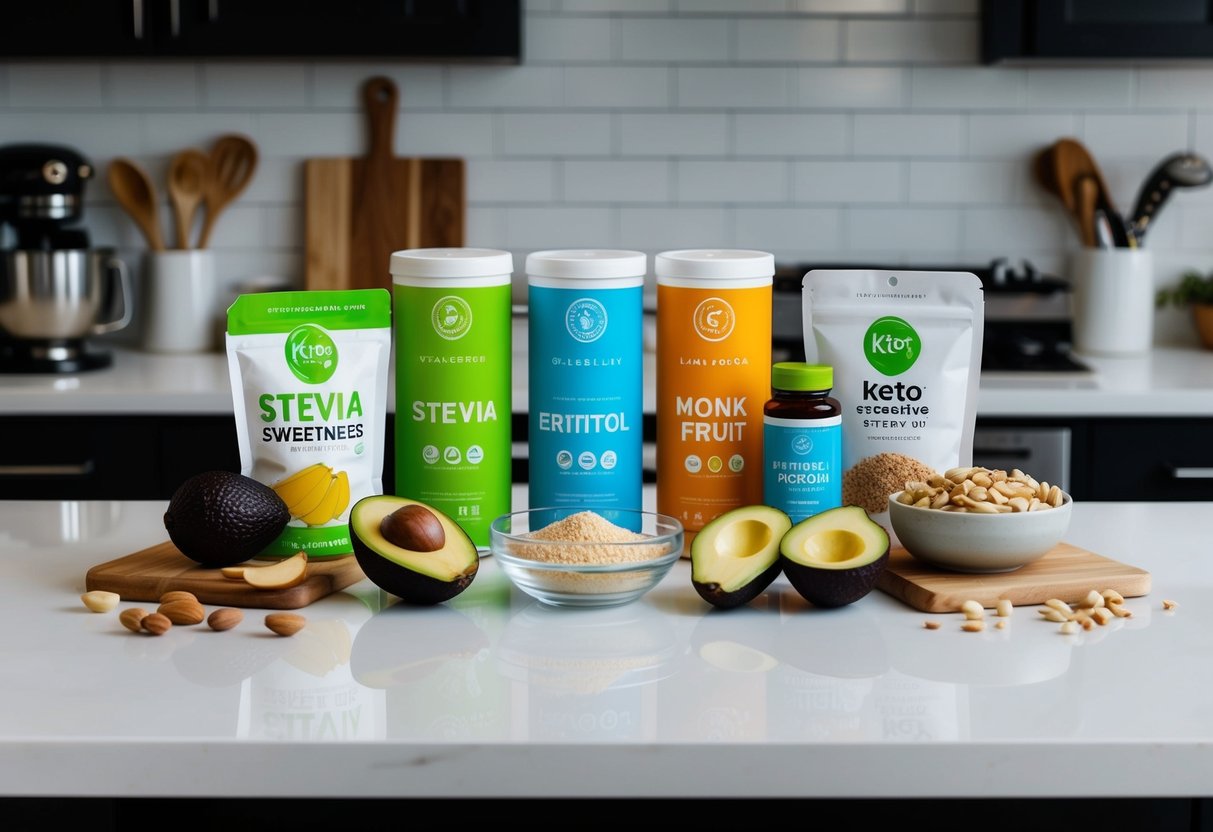
There are certain sweeteners to avoid on a keto diet, as they can cause spikes in blood sugar, hindering progress towards ketosis.
Sweeteners like maltodextrin, honey, and agave nectar should be off the menu for anyone committed to staying in ketosis.
Choosing the right sweetener is essential for maintaining the benefits of a ketogenic or low-carb diet.
With so many sweeteners available, it is essential to understand which are safe and which might impede progress.
The choice between natural and artificial sweeteners depends on individual preferences and health concerns.
A well-informed decision will support a healthier journey on a keto or high-fat diet.
Kickstart your keto transformation with a Custom Keto Diet plan tailored just for you
Key Takeaways
- Choose between natural and artificial sweeteners based on personal needs.
- Safe sweeteners for keto include stevia, erythritol, and monk fruit.
- Avoid sweeteners like honey and maltodextrin on a keto diet.
Understanding Keto and Sweeteners
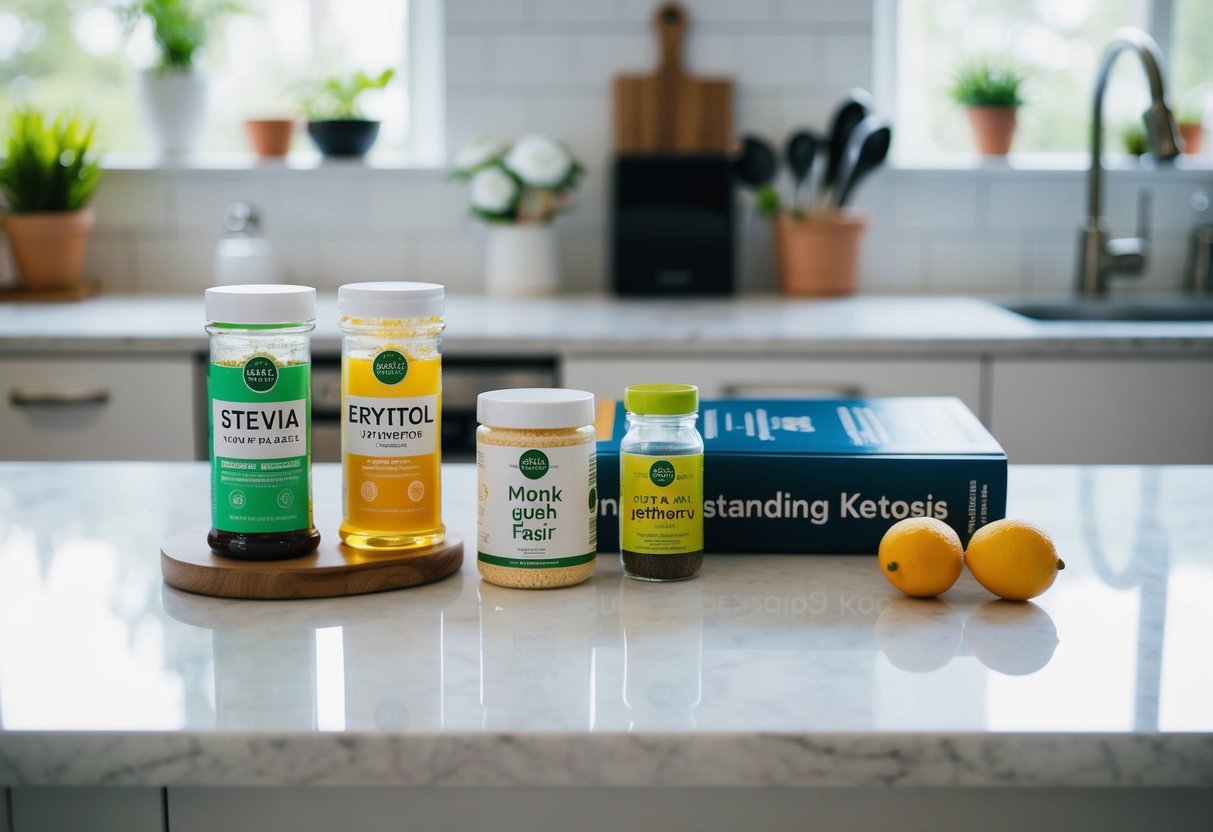
A low-carb, high-fat diet puts the body into ketosis, where fat is used for energy instead of carbohydrates. Sweeteners can affect this process by influencing blood sugar and insulin levels.
The Process of Ketosis
Ketosis is a metabolic state that the body enters when carbohydrate intake is very low.
Carbohydrates are usually converted into glucose, which provides energy. In ketosis, the body uses fat stores as the primary energy source instead.
When carbohydrates are limited, the liver produces ketones from fat, which are then used by organs and muscles for fuel.
This can lead to a steady supply of energy and less fluctuation in blood sugar levels. Ketosis can help some people maintain energy levels without the common sugar highs and lows.
Impact of Sweeteners on Ketosis
Sweeteners can have different effects on ketosis depending on their composition.
While sugars like sucrose can quickly raise blood sugar and insulin levels, leading to the disruption of ketosis, other sweeteners like stevia or erythritol have minimal impact.
These low-carb sweeteners don’t spike blood glucose or insulin.
Sucralose, monk fruit extract, and stevia are examples of sweeteners that might not interfere with ketosis.
It’s important to choose sweeteners that maintain low blood sugar and insulin levels to continue the benefits of ketosis, such as energy stability and fat burning.
Additionally, checking for hidden carbs in some sweeteners is crucial, as these can affect ketosis.
Learn how fasting enhances ketosis for even faster results. Check out our guide on How Intermittent Fasting Works with Keto to Accelerate Fat Loss.
Analyzing Natural vs. Artificial Sweeteners

Natural sweeteners like stevia can offer benefits such as being low in calories, while artificial options like aspartame may pose risks that could affect health areas like the gut microbiome or heart health.
Benefits of Natural Sweeteners
Natural sweeteners, such as stevia and monk fruit, are popular among those following a keto diet.
These sweeteners are low in calories, making them suitable for weight management and controlling blood sugar levels.
Stevia, derived from the leaves of the Stevia rebaudiana plant, does not contribute to blood sugar spikes. This can be beneficial in managing conditions like type 2 diabetes.
Additionally, natural sweeteners do not contain artificial ingredients and are less likely to irritate the gut microbiome.
A key advantage is that they can replace sugar in recipes without altering the overall taste. However, it’s important to choose high-quality products to ensure no added sugars that could disrupt ketosis.
Risks of Artificial Sweeteners
Artificial sweeteners, like aspartame and sucralose, are often used to reduce sugar intake.
While they are low in calories, some studies suggest they may have adverse effects, such as impacting the gut microbiome.
Alterations in gut health can potentially lead to digestion issues and inflammation.
There are concerns about the link between artificial sweeteners and various health conditions, including heart disease.
Although research is ongoing, caution is advised. Some artificial sweeteners can also increase cravings for sweet foods and may disrupt metabolism in some individuals.
It’s critical to be mindful of potential side effects and use these sweeteners in moderation to mitigate the risks.
Avoid this common sweetener mistake that could stall your progress. Follow our guide on Why Am I Not Losing Weight on Keto? Tips to Overcome Common Mistakes.
Safe Sweeteners for Keto
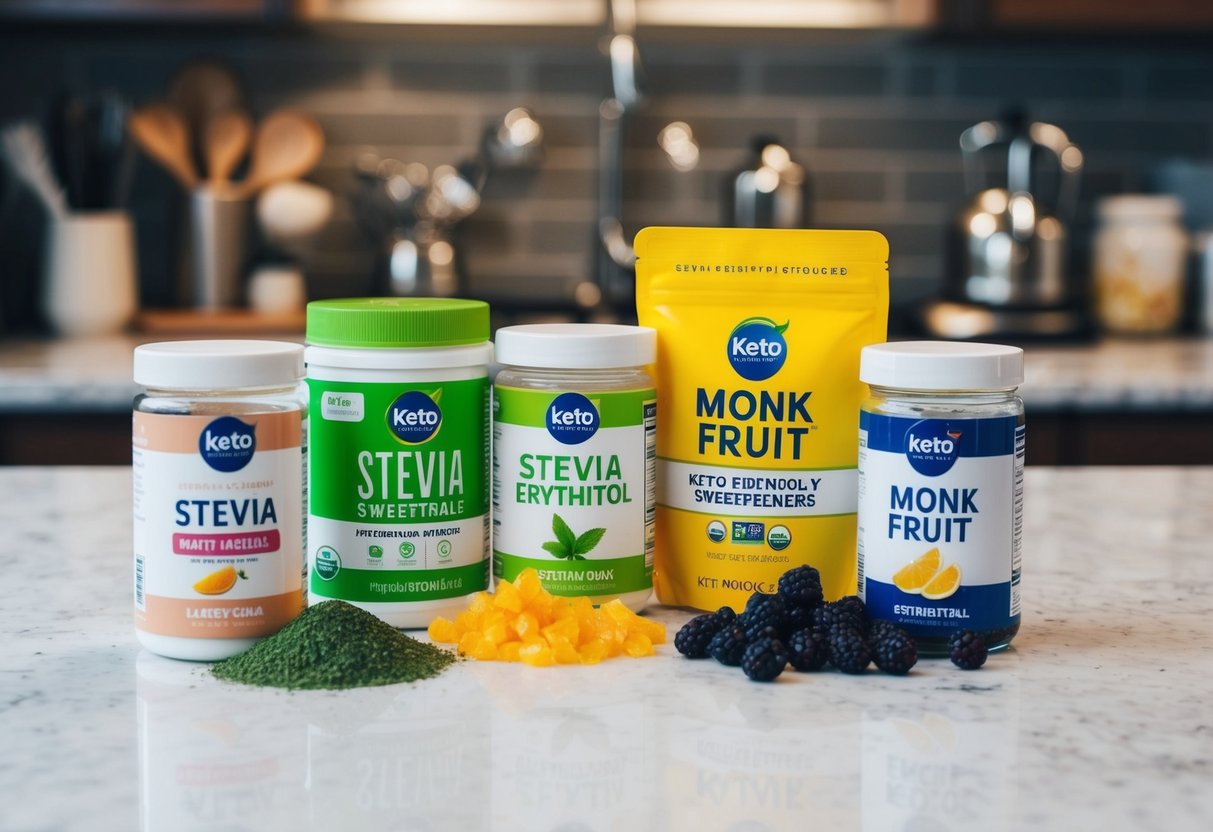
People on a ketogenic diet often look for sweeteners that won’t disrupt their low-carb lifestyle.
Stevia, erythritol, and monk fruit sweeteners are popular choices due to their ability to maintain ketosis and support weight management.
Stevia and Erythritol
Stevia is a natural sweetener derived from the leaves of the Stevia rebaudiana plant.
It is calorie-free and does not raise blood sugar levels, making it a good choice for weight loss. People often use stevia in beverages or baked goods as a sugar substitute.
Erythritol is a sugar alcohol that is also low in carbs and calories. It does not spike blood sugar and is often mixed with other sweeteners like stevia to improve taste.
Erythritol is well-tolerated by most people and can be used in various keto recipes.
Monk Fruit Sweeteners
Monk fruit sweeteners come from the monk fruit, also known as luo han guo.
They contain compounds called mogrosides, which are intensely sweet without adding calories.
Monk fruit sweeteners usually don’t affect blood sugar levels, making them keto-friendly.
Monk fruit sweeteners are heat-stable, so they can be used in both cooking and baking.
They are often found blended with erythritol to balance taste and texture. This makes them a versatile option for anyone following a ketogenic lifestyle.
Explore keto snacks made with clean, low-glycemic sweeteners.
Sweeteners to Avoid on a Keto Diet
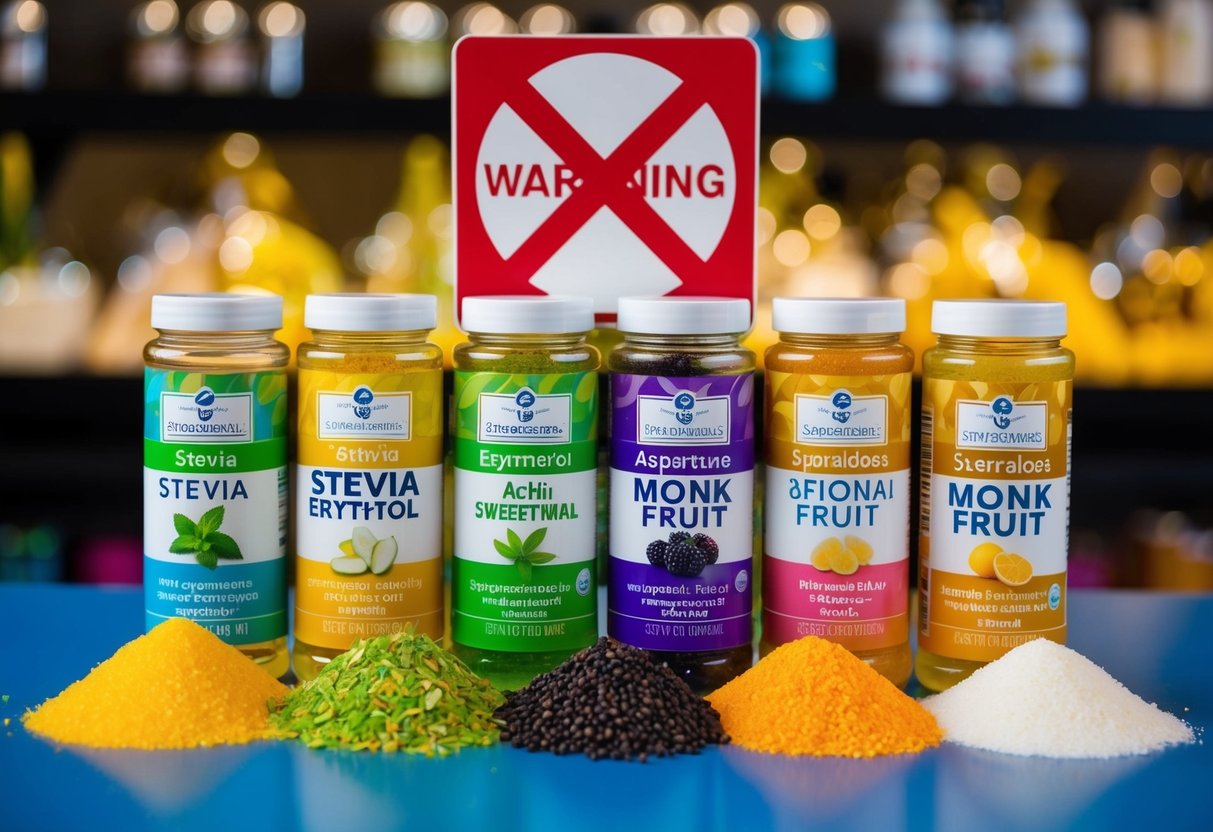
When following a keto diet, it’s crucial to avoid sweeteners that can increase carbohydrate intake or affect blood sugar levels. Some artificial sweeteners also raise health concerns like potential links to cancer.
High-Carb Sweeteners
High-carb sweeteners can significantly hinder ketosis.
It’s essential to watch for ingredients like maltodextrin, honey, and coconut sugar.
These sweeteners can raise blood sugar levels, disrupting the keto balance.
Table sugar and corn syrup are also high in carbohydrates, making them unsuitable for a keto lifestyle.
Avoiding these high-carb options helps maintain low carb intake, which is fundamental for the keto diet. Even small amounts can quickly add up, pulling the body out of ketosis and slowing progress.
Check out the best selling keto sweeteners from Amazon below.
Artificial Sweeteners and Health Concerns
Artificial sweeteners like aspartame and sucralose often appear in low-calorie or sugar-free products.
Although low in carbs, they come with potential health concerns.
Studies have explored links between aspartame and health issues, including cancer, though evidence remains mixed.
Acesulfame potassium (ACE) is another artificial option that some avoid due to its potential effects on health.
While research is still ongoing, many choose to minimize their use.
Opting for natural sweeteners that have fewer health risks is often a preferred choice for those concerned about long-term effects.
Tired of figuring it out alone? Get a science-backed Custom Keto Diet and skip the guesswork
Considerations for Specific Populations

When considering sweeteners on a ketogenic diet, it’s important to pay attention to specific needs. Different groups, such as children and diabetics, might respond differently to sweeteners due to variations in blood sugar and insulin levels.
Sweeteners and Children on Keto
Children on a ketogenic diet may follow it for reasons like managing seizures or weight control. For them, choosing the right sweeteners is important to maintain blood sugar levels and ketosis.
Some sweeteners can cause spikes in blood sugar, making the diet less effective.
Stevia and monk fruit extract are considered good options as they have little impact on insulin levels.
Undelayed blood sugar spikes are not only a concern for controlling seizures but also for preventing long-term health issues.
Parents should always consult healthcare providers to ensure the chosen sweeteners are appropriate for their child’s condition and diet goals.
Diabetics and Sweetener Choice
For diabetics, especially those with type 2 diabetes, managing blood sugar is crucial.
Sweeteners that don’t cause insulin spikes are ideal for maintaining stable glucose levels on a ketogenic diet.
Stevia, erythritol, and monk fruit extract are often recommended since they have a minimal impact on blood sugar.
These options help keep ketosis intact while allowing for a bit of sweetness in meals.
It’s important for diabetics to monitor their blood sugar levels regularly and consult their healthcare providers before making any changes to their diet or sweetener choices to ensure safety and effectiveness.
Explore meal plans with naturally sweetened low-carb treats.
Frequently Asked Questions
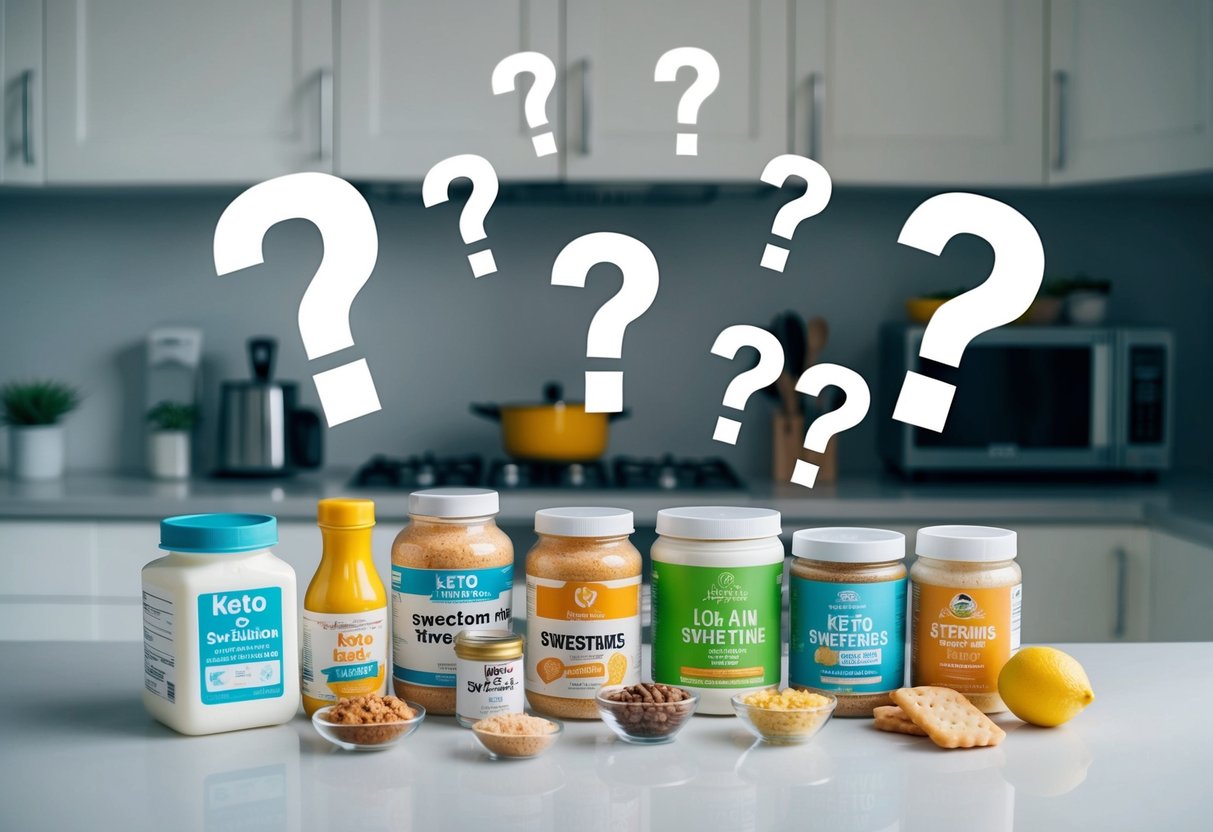
Choosing the right sweeteners is key for anyone on a ketogenic diet. Some sweeteners add carbs and sugar, which can disrupt ketosis. Others, like stevia and monk fruit, are better options. Here are answers to some common questions.
Which sweeteners are considered keto-friendly for my coffee?
Stevia and erythritol are two popular choices that fit well in coffee. They do not contain sugar or significant carbs and blend easily. Monk fruit is another good option. Always check labels for added ingredients that might affect carb counts.
Can I use stevia as part of a ketogenic diet?
Yes, stevia is a great choice for those following a keto diet. It comes from natural sources and contains zero carbs and calories. The sweet taste comes without raising blood sugar levels, making it ideal for maintaining ketosis.
What are the best sweetener options for keto-friendly baking?
When baking, erythritol and monk fruit are top choices. They mimic sugar’s texture, making baked goods taste and feel right. Allulose is another sweetener that combines well in recipes, providing sweetness without extra carbs.
Is Splenda suitable for those following a ketogenic diet?
Splenda contains sucralose but can also have added fillers that include carbs. It is important to check its packaging for these added ingredients.
Pure sucralose is keto-friendly, but splenda formulations with fillers may not be ideal.
What type of sweetener can diabetics safely use on a low-carb keto diet?
Diabetics on a keto diet can safely use stevia and monk fruit. These sweeteners do not affect blood sugar levels.
Erythritol is another good option, as it passes through the body without absorption, avoiding any blood sugar spikes.
Are there any sweet food options available to consume on a keto diet?
Yes, there are various keto-friendly snacks like dark chocolate made with stevia or monk fruit.
Many stores offer keto cookie mixes and energy bars. Just ensure they use low-carb sweeteners and fit within daily carb limits to stay in ketosis.
Conclusion
A keto diet limits carbs and sugars.
This means choosing sweeteners carefully.
Some sweeteners are keto-friendly.
These include erythritol, stevia, and monk fruit.
They have low or zero carbs and do not spike blood sugar levels.
Avoid high-carb sweeteners.
These include sugar, honey, and maple syrup.
They can disrupt ketosis.
Reading labels is important.
Some sweeteners may have hidden carbs or sugars.
This can affect your keto progress.
Using the right sweeteners can help maintain ketosis and satisfy a sweet tooth.
Balance is key.
Ready to eat better and live better? Start your Custom Keto Diet journey today



